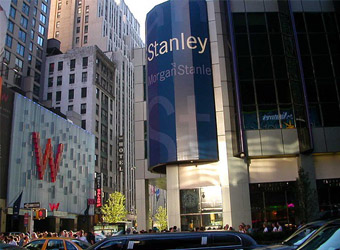Morgan Stanley’s Mike Wilson currently has one of the loftiest stock market targets on Wall Street, but he also expects a possible bear market on the horizon.
Wilson, Morgan’s chief equity strategist, said he expects the S&P 500 to reach 2,700 in the first part of next year, if things unfold as he forecasts. He doesn’t see a big sell off until after his target is reached, but once that happens it could mean a 20 percent decline.
In the meantime, stocks are benefiting from strong earnings, a still-easy Fed and the promise of economic stimulus.
Wilson said on CNBC’s Fast Money that Wednesday’s rally was fueled by the reflation trade. “Today is a short term euphoria but we think this is the primary trend: Small caps, financials energy” are all opportunities for investors. “That doesn’t mean that FANG or tech gets left behind. They can both work in concert now. So I think this is the next leg.”
Earnings for the third quarter should be good and could also give the market a bigger boost, especially if the investors who have been waiting for a pullback all summer put some of their sidelined cash into the market, Wilson said in an earlier interview with CNBC.com. “We’ve been looking for 2,550, 2,575 on the S&P before earnings season,” he said.
The index closed at 2,507 Wednesday, up 10 points.
Wilson says there is a risk of a slight stumble this fall — possibly a 5 to 6 percent pullback — before the S&P resumes its climb toward his 2,700 target. He said that could come in late October or early November.
Debate on tax reform could be a catalyst for a late-fall selloff, particularly if Congress does not look like it is in agreement on main elements. A blue print for a tax plan, created by GOP Congressional leadership and the White House, was unveiled Wednesday. The plan showed a decrease in the seven individual tax rates to just three, and a reduced corporate tax rate of 20 percent. But there were many details still missing.
“I think the way it sets up is people probably get excited over the next couple of weeks,” said Wilson, also chief investment officer of institutional securities and wealth management. Wilson said he expects earnings to keep buoying the market. “Then we’re going to have the inevitable disappointment.”
Wilson said market pros have been looking for a selloff all summer, but it didn’t come, even when there was nervous trading around tensions with North Korea. “It survived the test. The reason it survived the test is that fundamentals are too good,” he said. “There’s two ways to correct an overbought market. You could go down or you could go sideways. We took that latter route. “
Stocks should resume their climb if there is a fall sell off, and Wilson says the S&P 500 could ultimately reach his 2,700 target early next year, especially if stimulus and tax reform are approved. Wilson’s target is the highest among strategists in the CNBC strategists survey.
“We’ll get to 2,700 first, and then the timing of the beginning of the cyclical bear could be imminent. It could be any time after that. It could be as early as the second half of next year,” he said in the telephone interview.
A correction of that magnitude would be a normal thing for a market that has been in an eight year bull run. While he expects to see investors get much more excited by the market before it tumbles, it may not be like other periods, given the deep scars from the financial crisis.
“We probably won’t see the euphoria we saw in the late ’90s any time soon. The scar tissue is still too thick,” he said.
A decline of 20 percent from 2,700 would be 2,250. If the S&P does achieve 2,700, it would be up 300 percent from its crisis-era low in March 2009.
Wilson said Congress looks set to move ahead with stimulus even though at this point the market does not need it.
Later, he told Fast Money his call is for boom and bust. Wilson said the stimulus could help drive earnings and multiples, making 2,700 achievable.
“I think this is the trick…Be careful what you wish for. We’re late cycle. We made this call back in April. We’re looking for the boom, bust,” he said. The boom is the bump and euphoria from fiscal stimulus, and investors could get excited about tax cuts sometime early next year. “It actually brings the end of the cycle. That’s the irony.”
Source: CNBC


